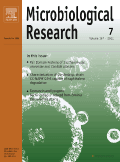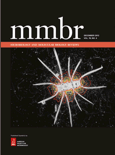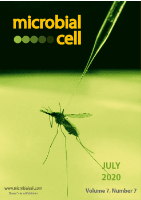
Cell Host & Microbe
Scope & Guideline
Connecting Microbiology with Health and Disease
Introduction
Aims and Scopes
- Host-Microbe Interactions:
The journal emphasizes research on how microorganisms interact with their hosts, influencing health and disease outcomes. - Microbial Ecology:
Studies that explore the ecology of microbial communities, including their composition, dynamics, and roles in various environments, particularly the human gut. - Immunology and Infection:
Research that investigates the immune responses to microbial infections, including viral, bacterial, and fungal pathogens, and how these responses can be modulated. - Therapeutic Applications:
The journal publishes studies on the development of microbial-based therapies, including probiotics, prebiotics, and engineered microbes for treating diseases. - Technological Advances in Microbiology:
Articles that focus on innovative methodologies and technologies, such as CRISPR, genomics, and bioinformatics, that enhance our understanding of host-microbe interactions. - Cross-Kingdom Interactions:
Research that investigates interactions between different kingdoms of life, such as fungi, bacteria, and viruses, and their collective impact on host health.
Trending and Emerging
- Microbiome and Mental Health:
There is a notable increase in research exploring the gut-brain axis and how gut microbiota influence mental health conditions, suggesting a significant interplay between microbial composition and neurological outcomes. - Metabolomics in Microbial Research:
The integration of metabolomics to study microbial interactions and their effects on host metabolism is on the rise, revealing insights into how microbial metabolites influence health. - Immunotherapy and Microbiome Interactions:
Emerging studies are focusing on how the microbiome affects the efficacy of immunotherapies in cancer treatment, indicating a critical role for microbial communities in shaping therapeutic outcomes. - Synthetic Microbiomes and Engineering:
Research on engineered microbial communities and synthetic biology approaches is expanding, aiming to design microbes for specific therapeutic purposes. - Antimicrobial Resistance Studies:
As antibiotic resistance becomes a pressing global issue, research focusing on understanding and combating antimicrobial resistance through microbiome manipulation is increasingly prevalent. - Viral Ecology and Evolution:
The exploration of viral communities within the microbiome, including their evolutionary dynamics and interactions with bacterial hosts, is gaining traction, reflecting a broader interest in viral roles in health and disease.
Declining or Waning
- Plant-Microbe Interactions:
While still relevant, research specifically focused on plant-microbe interactions has diminished as more emphasis has shifted towards human microbiome studies and their implications for health. - Traditional Antibiotic Research:
Studies primarily centered on the mechanisms of traditional antibiotics are less frequent, likely due to the growing interest in alternative therapies such as phage therapy and microbial consortia. - Single Organism Studies:
Research focusing on individual microbial species without considering the broader context of microbial communities has decreased as the field moves towards a more holistic understanding of microbiomes. - Basic Virology:
While virology remains important, basic studies on viral mechanisms without direct implications for host interactions or therapeutic applications are becoming less prominent in favor of studies with translational potential.
Similar Journals

Genes & Diseases
Advancing knowledge at the intersection of genetics and disease.Genes & Diseases, published by KEAI PUBLISHING LTD, is a premier open-access journal dedicated to advancing the fields of genetics, biochemistry, and molecular biology. Established in 2014 and headquartered in Beijing, China, this journal has quickly risen to prominence, securing a place in the prestigious Q1 quartile in Biochemistry and Genetics (clinical), as well as Q2 in Cell Biology and Q1 in Molecular Biology as of 2023. With a commitment to disseminating cutting-edge research, Genes & Diseases serves as a critical platform for researchers, professionals, and students alike, ensuring that high-quality scientific work is openly accessible to the global community. The journal's exceptional impact is underscored by its selective Scopus rankings, which reflect its influence and relevance in key scientific domains, making it an essential resource for those exploring the intersections of genetics and disease pathology.

TRENDS IN MICROBIOLOGY
Empowering Researchers with Cutting-Edge Microbial KnowledgeTRENDS IN MICROBIOLOGY is a premier academic journal published by CELL PRESS, renowned for its high-impact research contributions in the fields of microbiology, infectious diseases, medical microbiology, and virology. With an impressive impact factor and a notable Scopus ranking—placing it in the top tiers of its categories, including a remarkable Q1 status in multiple disciplines—this journal is essential for researchers, professionals, and students aiming to stay at the forefront of innovative microbial research and ongoing advancements in pathogen biology. Since its inception in 1993, TRENDS IN MICROBIOLOGY has provided a platform for thought-provoking reviews and critical insights, fostering discussions that shape the future of the microbiological sciences. Based in the United Kingdom, TRENDS IN MICROBIOLOGY continues to lead the way in disseminating vital knowledge within the global scientific community.

MICROBIOLOGICAL RESEARCH
Elevating Knowledge in Microbiology and ImmunologyMICROBIOLOGICAL RESEARCH, published by Elsevier GmbH, serves as a leading platform for advancements in the field of Microbiology, holding an impressive Q1 ranking in its category as of 2023. With an ISSN of 0944-5013 and E-ISSN 1618-0623, this journal has been instrumental in disseminating high-quality research since its inception in 1994 and continues to contribute significantly to the academic landscape through 2024. Positioned within the top 13% of publications in the Immunology and Microbiology category, ranked #24 out of 182 according to Scopus, it attracts the attention of researchers, professionals, and students alike. While the journal is not open access, it offers vital insights and peer-reviewed articles that drive innovation and exploration within microbiological research. Its rigorous selection process underscores the importance of quality and relevance in advancing knowledge in this dynamic field.

MICROBIOLOGY AND MOLECULAR BIOLOGY REVIEWS
Exploring the Intricacies of Life at the Microbial LevelMICROBIOLOGY AND MOLECULAR BIOLOGY REVIEWS, published by the American Society for Microbiology, is a premier journal dedicated to advancing the fields of microbiology and molecular biology. With an impressive impact factor reflective of its Q1 ranking in categories such as Immunology, Infectious Diseases, and Molecular Biology, this journal consistently showcases high-quality, peer-reviewed articles that contribute to the current understanding of microbial life and molecular mechanisms. Operating since 1997, the journal aims to bridge the gap between microbiological methods and molecular biology applications, making it an essential resource for researchers, professionals, and students alike. Readers can access content through various platforms, ensuring that the latest findings are readily available to the scientific community. With its esteemed reputation, MICROBIOLOGY AND MOLECULAR BIOLOGY REVIEWS remains a leading voice in the exploration of the life sciences, catering to a broad audience deeply invested in unraveling the complexities of microbial and molecular systems.

Current Research in Microbial Sciences
Illuminating the Pathways of Infectious Disease ResearchCurrent Research in Microbial Sciences is a distinguished peer-reviewed journal published by Elsevier, focusing on the dynamic and rapidly advancing fields of microbiology and infectious diseases. With an ISSN of 2666-5174, this journal has established itself as an essential resource for researchers, professionals, and students alike, offering the latest findings and insights from 2020 to 2024. The journal holds a significant position in the academic landscape, achieving a Q2 ranking across multiple categories, including Immunology and Microbiology, Infectious Diseases, and Medical Microbiology, demonstrating its impact in these critical areas of study. With impressive Scopus rankings—such as being placed in the 94th percentile for Immunology and Microbiology—current research is well-supported by a thriving scientific community. Although the journal is not open access, it serves as a vital platform for disseminating high-quality research and fostering collaboration within the microbial sciences. Engaging with this journal enables professionals and researchers to stay abreast of innovations and contribute to the collective body of knowledge that shapes our understanding of microbial interactions and infectious diseases.

ACTA MICROBIOLOGICA ET IMMUNOLOGICA HUNGARICA
Exploring the frontiers of microbial interactions.ACTA MICROBIOLOGICA ET IMMUNOLOGICA HUNGARICA is a distinguished academic journal published by AKADEMIAI KIADO ZRT, focusing on significant advancements in the fields of microbiology, immunology, and infectious diseases. Established in 1994, this journal serves as a vital platform for researchers, professionals, and students keen on exploring the complexities of microbial interactions and immune responses. With a current Impact Factor reflecting its rank within the Q3 categories for Immunology, Microbiology, and Infectious Diseases, it retains a critical position in disseminating innovative research. Although not open access, the journal provides extensive insights disseminated through various academic databases, ensuring a broad reach within the scholarly community. Its convergence over three decades indicates a robust commitment to excellence in scientific inquiry and knowledge sharing. As it moves towards the future, ACTA MICROBIOLOGICA ET IMMUNOLOGICA HUNGARICA continues to uphold its legacy of fostering collaborative research initiatives that contribute to the understanding and treatment of microbial diseases globally.

Microbial Cell
Exploring the dynamic world of microbiology and beyond.Microbial Cell is a distinguished open-access journal published by SHARED SCIENCE PUBLISHERS OG, focusing on the dynamic fields of microbiology, biochemistry, and molecular biology. Since its establishment in 2014, Microbial Cell has been at the forefront of disseminating cutting-edge research essential for advancing our understanding of microbial functions and interactions. With a commendable impact factor and ranking in the top quartiles (Q1 and Q2) across several categories, including Applied Microbiology and Biotechnology and Parasitology, this journal serves as an invaluable resource for researchers, professionals, and students alike. It features a comprehensive scope that encompasses the latest findings in genetics, cell biology, and virology, facilitating the academic community's access to high-quality peer-reviewed work. Microbial Cell not only contributes to advancing microbial sciences but also fosters an inclusive platform for knowledge sharing and collaboration in the scientific community.

Microbiology Spectrum
Exploring the vast landscape of microbial science.Microbiology Spectrum is a prominent peer-reviewed journal published by the American Society for Microbiology, dedicated to advancing the field of microbiology through the dissemination of high-quality research. Since its inception in 2013 and continuing until 2024, the journal has established a strong presence in key domains such as microbiology, immunology, cell biology, and ecology, achieving impressive quartile rankings including Q1 in Infectious Diseases and Q1 in Immunology and Microbiology as of 2023. With an emphasis on open access to its scholarly content, Microbiology Spectrum aims to foster collaboration and knowledge sharing among researchers, professionals, and students alike. The journal's scope encompasses a diverse range of topics pertinent to the field, making it an essential resource for anyone involved in microbiological research and its applications. Researchers looking to publish their findings in a respected journal will find Microbiology Spectrum's robust impact factor and Scopus rankings serve as testament to its significance and influence within the academic community.

Malaysian Journal of Microbiology
Unleashing the Power of Microbes: Open Access for AllMalaysian Journal of Microbiology is a prestigious open-access journal dedicated to advancing the field of microbiology, published by the Malaysian Society for Microbiology. Since its inception in 2005, this journal has become an essential platform for researchers and practitioners, facilitating the dissemination of innovative studies in applied microbiology, biotechnology, and infectious diseases. Based in Penang, Malaysia, this journal not only focuses on local microbiological research but also positions itself within the broader global scientific community. Although currently placed in the Q4 category in several relevant fields—including Applied Microbiology and Biotechnology, Infectious Diseases, and Medical Microbiology according to the 2023 Scopus rankings—it plays a crucial role in encouraging novel research and fostering collaboration among scientists. The journal encourages submissions that contribute to the understanding of microbial processes, disease mechanisms, and novel biotechnological applications, thereby supporting the continuous growth of knowledge in microbiology. With open access since its launch, the Malaysian Journal of Microbiology ensures that all published works are freely available to the public, enhancing their visibility and impact within the scientific community.

mSphere
Pioneering research at the intersection of microbiology and molecular biology.mSphere is a leading open-access journal published by the American Society for Microbiology, dedicated to the dynamic fields of Microbiology and Molecular Biology. Since its inception in 2016, mSphere has rapidly established itself as a reputable source of scholarly research, achieving notable impact factors and excellence within the academic community. The journal ranks in the top quartile (Q1) amongst its peers in Microbiology, and Q2 in the field of Molecular Biology, demonstrating its significance and relevance through Scopus rankings—specifically, it holds the #42 spot out of 182 in the Microbiology category and #108 out of 410 in Molecular Biology. With an editorial commitment to advancing the understanding of microbial and molecular sciences, mSphere provides an accessible platform for researchers, professionals, and students alike to disseminate groundbreaking findings. The journal promotes rigorous peer-review and invites innovative contributions aimed at enhancing microbial research mobility and molecular exploration. Accessible openly since 2016, mSphere continues to thrive as an influential publication driving scientific dialogue and discovery in the microbiological sciences.